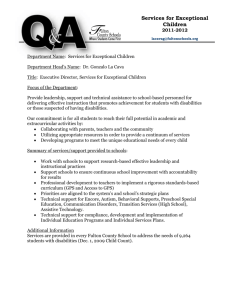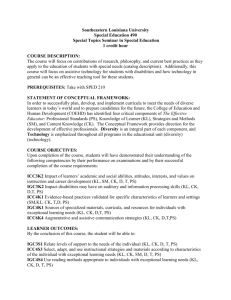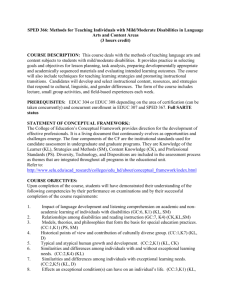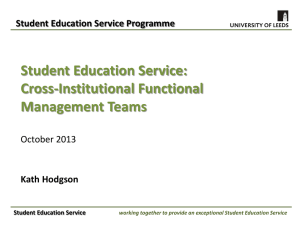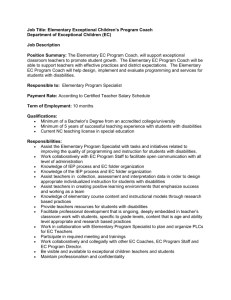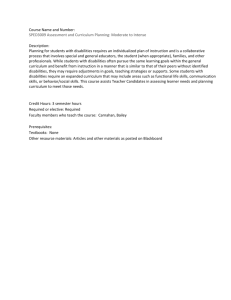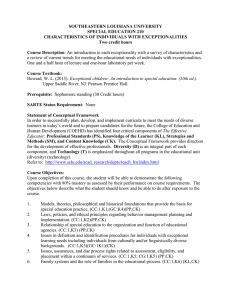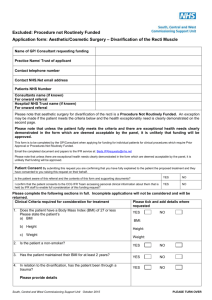(2012). High-Stakes test accommodations: Research and practice.
advertisement
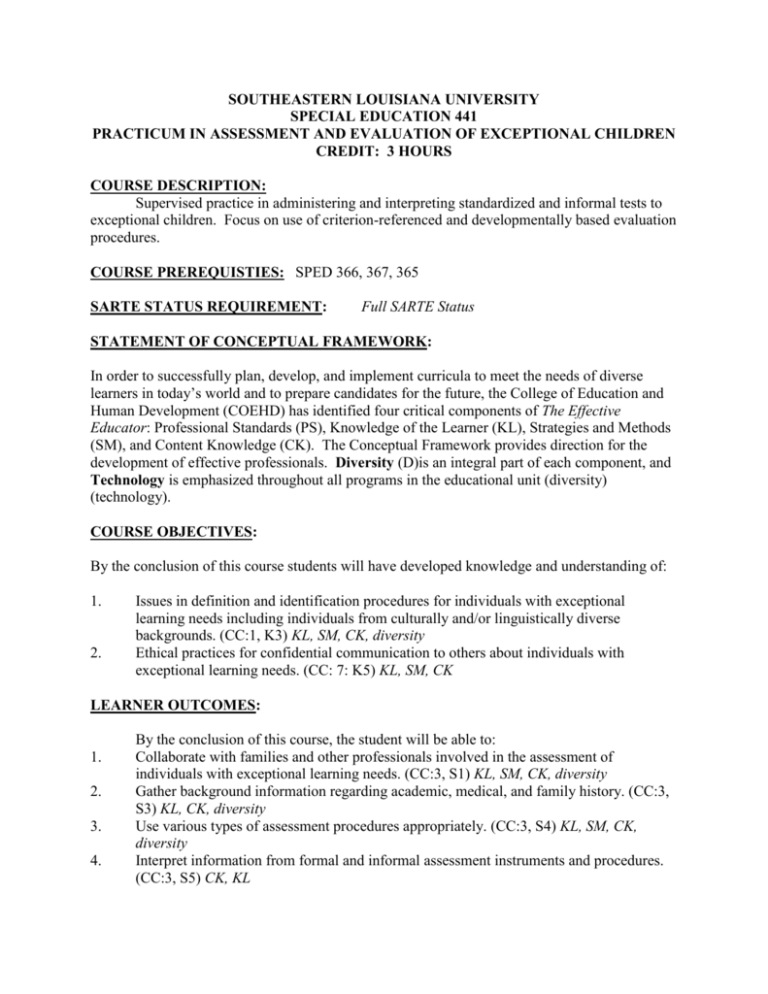
SOUTHEASTERN LOUISIANA UNIVERSITY SPECIAL EDUCATION 441 PRACTICUM IN ASSESSMENT AND EVALUATION OF EXCEPTIONAL CHILDREN CREDIT: 3 HOURS COURSE DESCRIPTION: Supervised practice in administering and interpreting standardized and informal tests to exceptional children. Focus on use of criterion-referenced and developmentally based evaluation procedures. COURSE PREREQUISTIES: SPED 366, 367, 365 SARTE STATUS REQUIREMENT: Full SARTE Status STATEMENT OF CONCEPTUAL FRAMEWORK: In order to successfully plan, develop, and implement curricula to meet the needs of diverse learners in today’s world and to prepare candidates for the future, the College of Education and Human Development (COEHD) has identified four critical components of The Effective Educator: Professional Standards (PS), Knowledge of the Learner (KL), Strategies and Methods (SM), and Content Knowledge (CK). The Conceptual Framework provides direction for the development of effective professionals. Diversity (D)is an integral part of each component, and Technology is emphasized throughout all programs in the educational unit (diversity) (technology). COURSE OBJECTIVES: By the conclusion of this course students will have developed knowledge and understanding of: 1. 2. Issues in definition and identification procedures for individuals with exceptional learning needs including individuals from culturally and/or linguistically diverse backgrounds. (CC:1, K3) KL, SM, CK, diversity Ethical practices for confidential communication to others about individuals with exceptional learning needs. (CC: 7: K5) KL, SM, CK LEARNER OUTCOMES: 1. 2. 3. 4. By the conclusion of this course, the student will be able to: Collaborate with families and other professionals involved in the assessment of individuals with exceptional learning needs. (CC:3, S1) KL, SM, CK, diversity Gather background information regarding academic, medical, and family history. (CC:3, S3) KL, CK, diversity Use various types of assessment procedures appropriately. (CC:3, S4) KL, SM, CK, diversity Interpret information from formal and informal assessment instruments and procedures. (CC:3, S5) CK, KL 5. 6. 7. 8. 9. 10. 11. 12. 13. 14. 15. 16. 17. 18. 19. 20. Report assessment results to individuals with exceptional learning needs, parents, administrators, and other professionals using appropriate communication skills. (CC:3, S6) KL, CK, diversity Use performance data and information from teachers, other professionals, individuals with exceptionalities, and parents to make or suggest appropriate modifications in learning environments. (CC:3, S7) KL, CK, diversity Develop individualized assessment strategies for instruction. (CC: 3, S8) KL, CK, SM Use assessment information in making instructional decisions and planning individual programs that result in appropriate placement and intervention for all individuals with exceptional learning needs, including those from culturally and/or linguistically diverse backgrounds. (CC: 3, S9) KL, CK, SM, PS Evaluate the results of instruction. (CC: 3, S10) CK, PS Evaluate the supports needed for integration into various program placements. (CC: 3, S11) KL, CK, SM Demonstrate positive regard for the culture, religion, gender, and sexual orientation of individual students. (CC:8, S2) KL, CK, diversity Promote and maintain a high level of competence and integrity in the practice of the profession. (CC: 8, S3) KL, CK,SM Exercise objective professional judgment in the practice of the profession. (CC: 8, S4) CK, SM Demonstrate proficiency in oral and written communication. (CC: 8, S5) SM Engage in professional activities that may benefit individuals with exceptional learning needs, their families, and/or colleagues. (CC: 8, S6) KL, CK, SM Comply with local, state, provincial, and federal monitoring and evaluation requirements. (CC: 8, S7) PS, SM, CK Use copyrighted educational materials in an ethical manner. (CC: 8, S8) SM Practice within the CEC Code of Ethics and other standards and policies of the profession. (CC: 8,S9) SM Implement procedures for assessing and reporting both appropriate and problematic social behaviors of individuals with disabilities. (GC: 3, S1) KL, CK, SM Use exceptionality-specific assessment instruments with individuals with disabilities. (GC: 3, S2) KL, CK, SM, diversity, technology ARTIFACTS APPROPRIATE FOR PORTFOLIO: Assessment Case Study, Assessment Field Hours COURSE OUTLINE: Introduction Explanation of course objectives and outcomes Explanation of course requirements Developing IEP goals and objectives from evaluation report outcomes. Developing informal assessment instruments for case study student and for groups CBM Inventories Checklists CRT Interview Observation Error Analysis of student work Developing formative assessments for instruction Developing lesson plans from formative assessment results Performance Assessment Developing rubrics Scoring student work using a rubric Scoring student work for a portfolio Interpreting outcomes Formal Assessment Procedures for norm-referenced test administration Scoring norm-referenced tests Interpreting norm-referenced test scores When to use norm-referenced testing through vignettes Writing Evaluation Reports Interpreting test results Writing the report Making recommendations Writing Goals and Objectives for an IEP from an Assessment Report FIELD EXPERIENCE: Hours: 60 Type: Candidates create, administer, score, and interpret norm-referenced tests, and several types of informal assessments. REQUIRED UNIT/PROGRAM ASSESSMENTS: Field experience hours Case study evaluation report Dispositions Professional development COURSE EVALUATIONS Case study evaluation report Performance assessment instruments CBM charts for reading fluency, comprehension, math computation, spelling, and written expression. Formative assessment techniques Weekly progress reports Parent conference observation Instructor observation of norm-referenced test administration Dispositions KNOWLEDGE BASE Blatchley, L A., & Lau, M.Y. (2010). Culturally competent screening and special education referral: A systematic approach. National Association of School Psychologists Communique, 38(7), 27-30. Cavendish, W. (2013). Identification of learning disabilities: Implications of proposed DSM-5 criteria for school-based assessment, Journal of Learning Disabilities, 46(1), 52-57. Cho, H-J., & Kingston, N. (2013). Why IEP teams assign low performers with mild disabilities to the alternate assessment based on alternate achievement standards. The Journal of Special Education, 47(3), 162-185. Dorn, S. (2010). The political dilemmas of formative assessment. Exceptional Children, 76(3), 325-338. Fletcher, T. V., Navarrete, L. A. (2011). Learning disabilities or difference: A critical look at issues associated with the misidentification and placement of hispanic students in special education programs. Rural Special Education Quarterly, 30(1), 30-38. Karvonen, M., Wakeman, S., Flowers, C., & Moody, S. (2013). The Relationship of Teachers' Instructional Decisions and Beliefs about Alternate Assessments to Student Achievement. Exceptionality, 21(4), 238-255. Lai, S. A., & Berkeley, S. (2012). High-Stakes test accommodations: Research and practice. Learning Disability Quarterly 35(3), 158-169. Lebeer, J., Birta-Székely, N., Demeter, K., Bohács, K., Candeias, A.A., Sønnesyn, G., Partanen, P., & Dawson, L. (2012). Re-assessing the current assessment practice of children with special education needs in Europe, School Psychology International, 33(1), 69-93. Park, Y., Benedict, A. E., & Brownell, M.T. (2014). Construct and predictive validity of the CORE phonics survey: A diagnostic assessment for students with specific learning disabilities, Exceptionality, 22(1), 33-65. Stockall, N., & Smith, R. E. (2013). Alternative assessment portfolios for students with intellectual disabilities: A case study. Exceptionality, 21(3), 127-159. SPECIAL EDUCATION PUBLICATION WEBSITES Teaching Exceptional Children http://journals.sped.org/index.cfm?fuseaction=tec_toc Exceptional Children http://journals.sped.org/index.cfm?fuseaction=ec_toc CEC Today Online http://www.cec.sped.org/bk/cectoday/index.html Special Education/Gifted Education Journals http://ericec.org/fact/journals.html The Journal of Special Education http://www.proedinc.com/jse.html Remedial and Special Education http://rse.sagepub.com/ Intervention in School and Clinic http://isc.sagepub.com/ Journal of Learning Disabilities http://ldx.sagepub.com/
